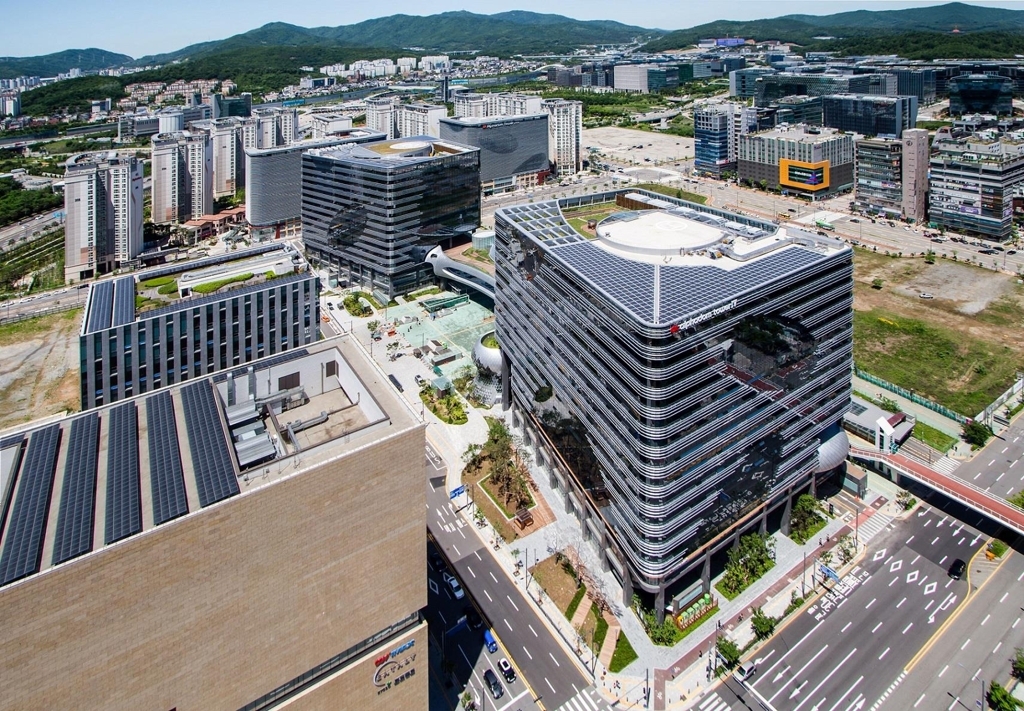Pangyo offices under limelight in deregulation hopes: report
By Son Ji-hyoungPublished : Aug. 17, 2020 - 16:56

Pangyo, a South Korean version of Silicon Valley, is garnering attention as an emerging destination for office investment as key regulations affecting the area are set to expire, a report showed Monday.
The stabilizing occupancy in Pangyo 1st Techno Valley and Pangyo Alpha Dome City and the 10-year restrictions being gradually lifted from Pangyo 1st Techno Valley starting this year will generate new investment opportunities despite COVID-19, according to a report by real estate services firm Colliers International.
“We recommend investors focus on offices that will soon come to the market once restrictions on resales in Pangyo 1st Techno Valley are lifted,” wrote Judy Jang, associate director at Colliers International Korea.
Pangyo is home to industrial complexes branded as Pangyo Techno Valley, which is adjacent to Seoul’s southern districts including Gangnam. Alongside Pangyo 1st Techno Valley -- which is home to 1,300 companies and 74,000 employees and has generated total tenant sales of some 87 trillion won ($73.3 billion) in 2019 -- the second and third of its kind are set to be built in 2022 and 2025, respectively.
In the meantime, domestic internet rivals Naver and Kakao will lease part of Pangyo Alpha Dome City, which surrounds Pangyo Station, starting in 2021, as construction projects are set to be completed then.
Located in Seongnam, Gyeonggi Province, the Pangyo area currently houses major information technology firms such as Naver, Kakao, gaming companies NCSoft, Nexon and Krafton, as well as other high-tech firms dedicated to biotechnology, culture technology and nanotechnology.
Jang said the trend is likely to change in the long run, as the tenant profile is expected to be more resilient with the relaxation in 2030 of a restriction limiting tenancy to high-tech businesses.
“As the resale restrictions are lifted starting this year and progressively through 2030, the tenant profile will be much different from the existing IT-heavy occupiers,” Jang wrote.
The area has seen sales prices increase on the back of growing investor demand and low interest rates. Colliers International estimated that offices near Pangyo Station went for $5,000 per square meter in the first half of 2020, up from $4,000 per square meter in 2018. The corresponding figure for Gangnam-gu, Seoul, is projected to reach $8,000 per square meter by the end of 2020.
Investors who benefited from the higher valuation include Shinhan Alpha REITs, which purchased Krafton Tower near Pangyo Station in 2018, and the Public Officials Benefit Association, which is looking to sell its stake in the Pangyo Alpha Dome 6-1 block office building leased by Kakao, showed the report.
By Son Ji-hyoung (consnow@heraldcorp.com)
The stabilizing occupancy in Pangyo 1st Techno Valley and Pangyo Alpha Dome City and the 10-year restrictions being gradually lifted from Pangyo 1st Techno Valley starting this year will generate new investment opportunities despite COVID-19, according to a report by real estate services firm Colliers International.
“We recommend investors focus on offices that will soon come to the market once restrictions on resales in Pangyo 1st Techno Valley are lifted,” wrote Judy Jang, associate director at Colliers International Korea.
Pangyo is home to industrial complexes branded as Pangyo Techno Valley, which is adjacent to Seoul’s southern districts including Gangnam. Alongside Pangyo 1st Techno Valley -- which is home to 1,300 companies and 74,000 employees and has generated total tenant sales of some 87 trillion won ($73.3 billion) in 2019 -- the second and third of its kind are set to be built in 2022 and 2025, respectively.
In the meantime, domestic internet rivals Naver and Kakao will lease part of Pangyo Alpha Dome City, which surrounds Pangyo Station, starting in 2021, as construction projects are set to be completed then.
Located in Seongnam, Gyeonggi Province, the Pangyo area currently houses major information technology firms such as Naver, Kakao, gaming companies NCSoft, Nexon and Krafton, as well as other high-tech firms dedicated to biotechnology, culture technology and nanotechnology.
Jang said the trend is likely to change in the long run, as the tenant profile is expected to be more resilient with the relaxation in 2030 of a restriction limiting tenancy to high-tech businesses.
“As the resale restrictions are lifted starting this year and progressively through 2030, the tenant profile will be much different from the existing IT-heavy occupiers,” Jang wrote.
The area has seen sales prices increase on the back of growing investor demand and low interest rates. Colliers International estimated that offices near Pangyo Station went for $5,000 per square meter in the first half of 2020, up from $4,000 per square meter in 2018. The corresponding figure for Gangnam-gu, Seoul, is projected to reach $8,000 per square meter by the end of 2020.
Investors who benefited from the higher valuation include Shinhan Alpha REITs, which purchased Krafton Tower near Pangyo Station in 2018, and the Public Officials Benefit Association, which is looking to sell its stake in the Pangyo Alpha Dome 6-1 block office building leased by Kakao, showed the report.
By Son Ji-hyoung (consnow@heraldcorp.com)








![[Graphic News] More Koreans say they plan long-distance trips this year](http://res.heraldm.com/phpwas/restmb_idxmake.php?idx=644&simg=/content/image/2024/04/17/20240417050828_0.gif&u=)
![[KH Explains] Hyundai's full hybrid edge to pay off amid slow transition to pure EVs](http://res.heraldm.com/phpwas/restmb_idxmake.php?idx=644&simg=/content/image/2024/04/18/20240418050645_0.jpg&u=20240419100350)






![[From the Scene] Monks, Buddhists hail return of remains of Buddhas](http://res.heraldm.com/phpwas/restmb_idxmake.php?idx=652&simg=/content/image/2024/04/19/20240419050617_0.jpg&u=20240419175937)

![[KH Explains] Hyundai's full hybrid edge to pay off amid slow transition to pure EVs](http://res.heraldm.com/phpwas/restmb_idxmake.php?idx=652&simg=/content/image/2024/04/18/20240418050645_0.jpg&u=20240419100350)

![[Today’s K-pop] Illit drops debut single remix](http://res.heraldm.com/phpwas/restmb_idxmake.php?idx=642&simg=/content/image/2024/04/19/20240419050612_0.jpg&u=)